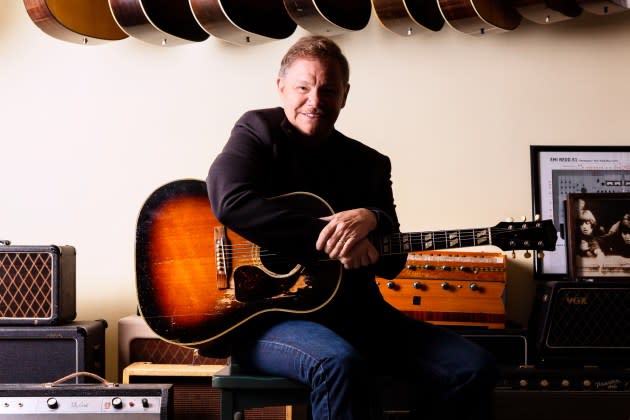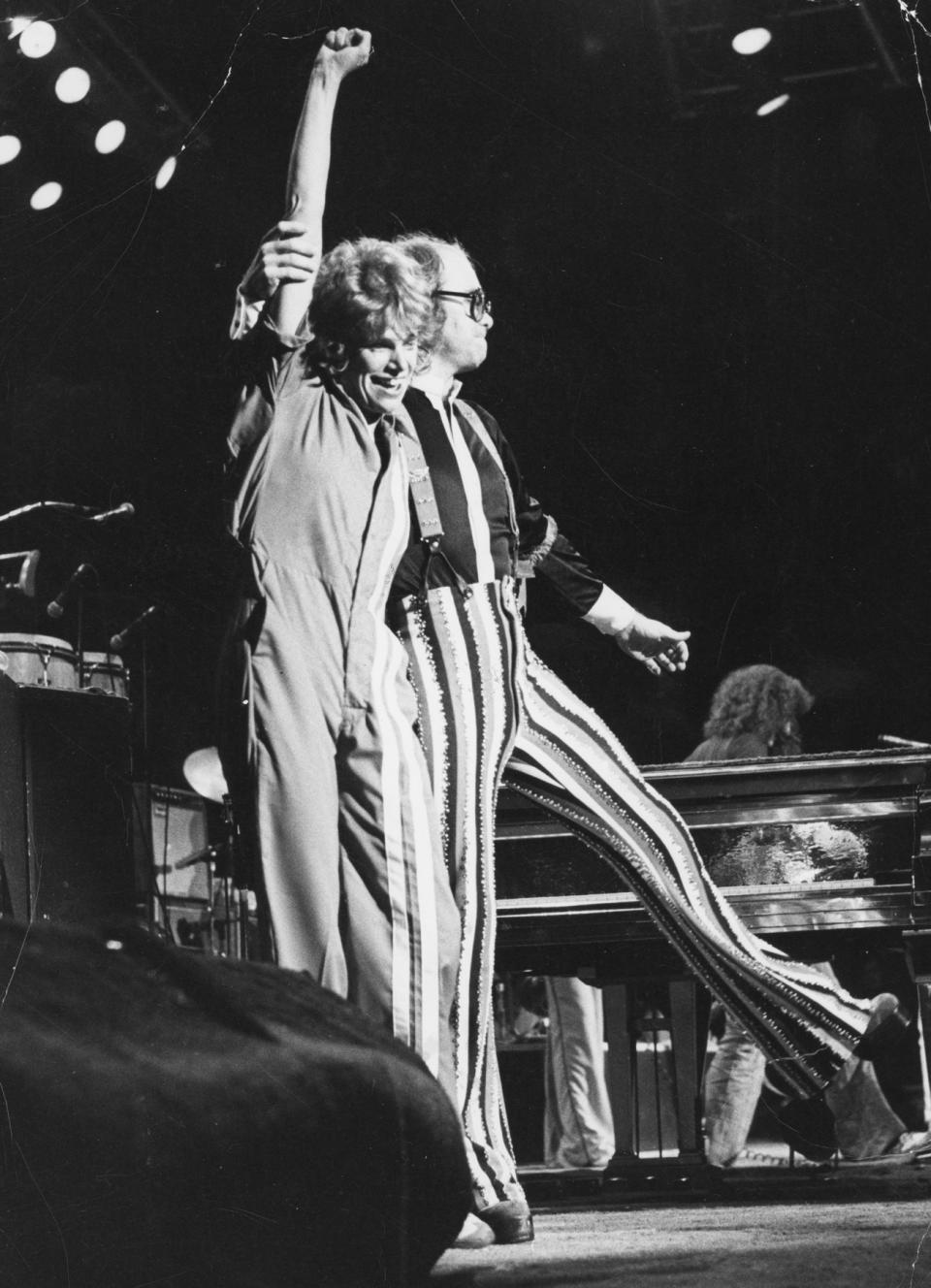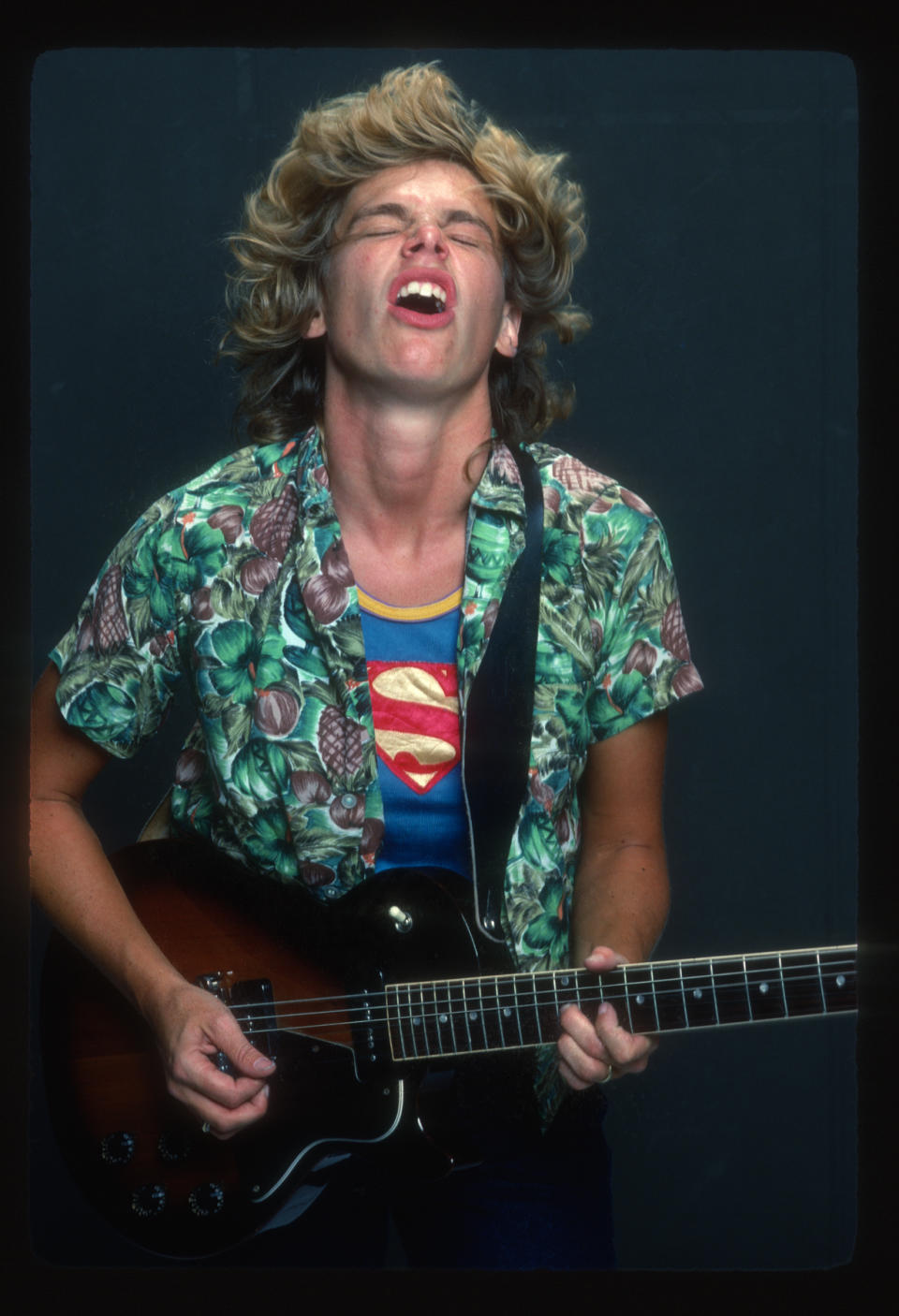Cidny Bullens Sang on ‘Grease’ and With Elton John. Transitioning Helped Him Find His Voice
- Oops!Something went wrong.Please try again later.
- Oops!Something went wrong.Please try again later.
- Oops!Something went wrong.Please try again later.

In his home office in Nashville, Cidny Bullens glances at a photo perched behind him: a young, pouty-faced 28-year-old in a Superman T-shirt, cradling an electric guitar. “I look at me as a different person,” says Bullens, who now sports short hair and a wisp of a mustache. “I don’t say, ‘Oh, that’s a great picture.’ It’s like an entity, you know.”
That photo adorned the cover of Desire Wire, the 1978 debut album by the artist then-known as Cindy Bullens. By the time of its release, Bullens had a formidable résumé, touring as a member of Elton John’s band and featuring on three tracks on the multiplatinum soundtrack Grease, an Album of the Year Grammy nominee in 1979. Unlike the wholesome pop of that movie tie-in album, Desire Wire cast Bullens as an arena-ready rocker eager to kick out a few jams. The singer, says producer and musician Mark Doyle, Bullens’ guitarist at the time, was “just electric — jumping off pianos, having all the Jagger pouting. But it didn’t really come off as shtick. It was genuine.”
More from Rolling Stone
'The Masked Singer' Unmasks a Trailblazing LGBT Icon and Sports Legend
Bernie Taupin on His Seventies Visit to the Playboy Mansion: 'What a Dump'
Elton John 'In Good Health' After Brief Hospitalization Following Fall at Home
In the decades to follow, Bullens coped with failed record companies and industry restrictions on what type of music they believed women should and shouldn’t make, even how Bullens should dress onstage. Eventually, Bullens married, had two children, lived the life of a stay-at-home mom, and periodically made a new record. “I have a tiny bit of resentment that I’m not in any of the books of the history of women in rock & roll,” Bullens says. “Fanny and the Runaways were around and great, but there were no solo women out there who played electric guitar, wrote their own songs, and had the whole package. I was out there shredding the guitar and doing all the antics.”
Just over a decade ago, Bullens underwent a more significant change. After years of feeling he was “a man in a woman’s body,” Bullens transitioned in 2012 and is now Cidny Bullens. Eight years later, Bullens self-released his first post-transition album, Walkin’ Through This World. The album, now retitled Little Pieces and featuring a bonus track with Beth Nielsen Chapman, has just been reissued by Kill Rock Stars, the longtime indie that signed and championed riot-grrrl bands like Bikini Kill and Bratmobile in the Nineties.
The pop world has seen its share of trans figures, including, early on, composer and Moog pioneer Wendy Carlos and later, British composer Dee Palmer, who transitioned in 1998, and Laura Jane Grace. But Bullens’ story is unique not only because he’s reintroducing himself at 73, but because he’s doing so in a world — Americana and roots music — that’s also learning to accept his transition.
“I like to say changing genders is not for the faint of heart,” Bullens says. “Have I lost opportunities in my life? Yep, I have. I still lose opportunities. Have I lost friends? Not my closest friends. Have I gained friends? Yes. But it’s not without risk. There have been consequences, personal and professional.”
GROWING UP IN Massachusetts, Bullens says he knew he was different at a young age. “You’ve got more male hormones than female hormones,” his mother once said to him as Cindy. “You were born wrong.” As Bullens says now, “From the time I was three years old, I knew I was a boy. I knew I was in the wrong body.” In Bullens’ recent memoir, TransElectric: My Life as a Cosmic Rock Star, he writes about being 12, shirtless, and lying on some grass on a hot summer day: “A puff of ocean breeze made me turn onto my back, and my right hand brushed against my chest. I stopped breathing. I shivered in horror. I felt a pea-sized bump beneath my left nipple. Oh no, I thought, now I’m going to have to pretend to be a girl for the rest of my life.”
Relocating to L.A. to break into the Seventies music business, Bullens worked for Bob Crewe, the songwriter best known for supplying a string of hits to Frankie Valli and the Four Seasons. As his assistant and gopher, Bullens was plunged into a world of sex, drugs, drug dealers, and rock & roll. As he writes of Crewe, “For someone who wrote such upbeat songs, Bob had a lot of darkness inside him. He drank most of the day and all night long.… He paid for sex. He scared the shit out of me.” Through a friendship with the late Bobby Neuwirth, a singer, songwriter, and Bob Dylan cohort, Bullens joined in on Dylan’s pre-Rolling Thunder Revue club shows in Greenwich Village in 1975.
During the same period, Bullens met Elton John when he crashed an industry party. Bullens noticed John, then at the peak of his Captain Fantastic and the Brown Dirt Cowboy moment, when he walked in. “Suddenly, I turned and looked, and he was walking straight toward me,” Bullens says. “I really thought he was going to kick me out. He asked me my name and said, ‘My name is Elton — I don’t believe we’ve met yet.’ We talked, but I don’t remember anything we said. Let’s just say I believe he did not know what gender I was.”

As John writes in the foreword to TransElectric, “Cindy had everything going for her. She had the songs, the voice, the guitar, the attitude, the look. It was a bit like Hilary Swank in Boys Don’t Cry. That kind of tomboy look that was so sexy.”
John wasn’t the only one drawn to Bullens’ mystique. When Doyle first met Bullens, he says the singer was “just nonchalantly standing at the bar at the Bottom Line in New York and basically looked like a guy with curly blond hair and a tweed sport jacket. [Bullens] was probably the only truly androgynous person I’ve ever met. Everybody had a crush on her.”
With only one day’s notice, Bullens says he was offered to join either Rolling Thunder or John’s band, and went with the latter: “They were both going at the same time, which I still am pissed about. It would have been a whole different ballgame.” Still, Bullens’ tenure in John’s band thrust him into the rock stratosphere; he was soon singing with Rod Stewart, hanging with John pal Billie Jean King, dining with Freddie Mercury, and doing his share of cocaine. When the producers of Grease wanted a wholesome voice for some of that soundtrack’s faux-Fifties pop songs, Bullens landed that gig too.
With a record deal of his own, Bullens made Desire Wire; its hit, “Survivor,” incorporated power chords and a pop hook. But Bullens’ record company, United Artists, folded soon after its release. The follow-up, Steal the Night, refashioned Bullens as a New Wave bopper — beating Patty Smyth and Scandal, among others, to the punch — but it didn’t spawn a hit. Soon after, Bullens recalls being asked by a label executive to swap boyish attire for tank tops and dangly earrings. “He said, ‘We want you to be more like Pat Benatar,’” Bullens recalls. “I was making records before Pat Benatar. He wanted me to move more like a woman and not wear my Superman T-shirt, and I couldn’t do it. I was who I was. So I walked out. And little did I know, when all that happened, that it would be the end of my career.”
When Bullens tried to score a contract with another label, he ran into predictable roadblocks of the time. “I remember walking into record companies and having them say, ‘Well, we already have a woman on our roster,’” he says. “And I’m like, ‘Really? You have a woman.’ But that was it.”
In 1983, Doyle, then Meat Loaf’s guitarist, helped get Bullens a job as Loaf’s backup singer — the prime spotlight slot previously occupied by Karla DeVito. According to Bullens and Doyle, Loaf wanted Bullens to dress in lingerie and do the fake make-out scene in “Paradise by the Dashboard Light.” Bullens refused, opting for a jumpsuit and no theatrics. “It didn’t go well,” Doyle says, adding that Bullens “refused to wear a dress.” The Meat Loaf job lasted one show.
Over the next dozen or more years, Bullens largely retreated from music. He married Dan Crewe, Bob’s brother, who worked in real estate and was older. Bullens gave birth to two daughters, Reid in 1982 and Jessie in 1985. An occasional album emerged and faded away, and the singer tried to embrace a new life. “Even nine months pregnant with my babies, and then breastfeeding with my babies, I never felt like a woman,” he says. “I always knew I was a guy. But I just pulled that in. I just lived with being Cindy Bullens and dressing the way I dress and having my family. I just went about my business and in life, but it was always there.”

Starting in the mid-Nineties, Bullens’ life was tossed many curveballs. As he details in TransElectric, Cindy’s marriage was far from conventional, starting with the fact that Crewe was closeted: “Dan was still gay. Not a soul around us knew our true stories. And the funny thing was, Dan and I were not intentionally trying to hide anything about ourselves. We were just us: married with two kids in Connecticut.”
They later moved to Maine, but the arrangement couldn’t last; he and Crewe separated and ultimately divorced. Tragically, his youngest daughter, Jessie, was diagnosed with cancer and, in 1996, died at age 11 of stage 4 Hodgkin’s disease. In 1999, Bullens channeled the resulting pain into Somewhere Between Heaven and Earth, a collection of songs about loss in which Bullens found his voice as an Americana singer-songwriter. He recently rerecorded its standout song, “Boxing With God,” with longtime friend Lucinda Williams, for a future release.
IN 2011, A FEMALE FRIEND of Bullens’ called to say she had transitioned to a man. Bullens was stunned, but it resonated, prompting him to consider making the leap himself. Opting for top surgery, in which his breasts would be removed, he took his first shot of testosterone in 2011. “I knew I was dropping a bomb into my life,” he says. “My siblings were going, ‘What the hell are you doing?’ My friends were all worried for me. But I said to myself, ‘I am old. Whose life am I living? And what life am I living? Who am I living my life for?’ My daughter Reid was married and had her own children. By that time I had been single for many years. I was responsible for no one directly.”
Doyle recalls a letter Bullens sent to close friends, informing them of his decision. “Basically, he was going through the reasons,” he says. “There was like an FAQ section: ‘Are you going to be more masculine?’ And he wrote, ‘How is that even possible?’ And it’s true. He was always super masculine. We used to talk about when he hitchhiked across the country and ended up in L.A. pumping gas, and in every story you sort of pictured a guy.”
The surgical procedure took place in May 2012. In the aftermath, Bullens’ voice became lower, and he changed the keys in all his songs. “It was like being in puberty twice,” he says with a laugh. “It took about a year and a half for my voice to settle into what it is now.” Still in Maine, he took a job in the fulfillment warehouse at L.L. Bean. “He was figuring out what to do next,” says singer-songwriter Mary Gauthier, who met him during this period when she played a show in that state. “He had completely left the music business behind, and there was a bit of sorrow about that.”
Eventually, Bullens began writing new songs for his lower register, including “Little Pieces” and, most momentously, “The Gender Line” (“Would you think you were crazy/And out of your mind/You’re not in your body/You’re living a lie”). Just before lockdown, working with producer Ray Kennedy, Bullens made a record of those songs, Walkin’ Through This World.
But the possible fallout of his transition became clear when he tried to shop the album around to record companies. “It fell on deaf ears — dead silence, and even from people I knew,” he says. “Some said, ‘It doesn’t fit on our roster.’ It was a little bit of a shock. I was hearing behind the scenes that it might have something to do with the trans thing. I will not say that every single rejection was that. There are a lot of other factors that could have gone into it. But I will say I felt it was part of it.” Bullens wound up self-releasing the album through Bandcamp and other outlets, and also turned to writing his memoir.
By good fortune, Kill Rock Stars had launched an Americana-leaning offshoot label, Kill Rock Stars Nashville. Co-founder Slim Moon reached out to Bullens to contribute to a compilation of queer alt-country, but when he heard Bullens had made a self-released record, he jumped at the chance to put it out. “Part of the legacy of Kill Rock Stars is to be activist through who we choose to work with,” Moon says. “Now, we’re working with a lot of queer artists, and we have many trans artists on the label. We’re trying to support marginalized voices who deserve to be heard.”
As supportive as the label has been, Bullens senses that other parts of the industry are less enamored of his transition. He says he’s lost out on gigs as well as the charity work he once did. “When you go first, it can be very lonely,” says Gauthier, one of the first gay women to make a name for herself in the Nashville community. “He risked it all to be true to himself. The songs warrant him being booked, but that’s part of the story that hasn’t been written yet.”
Moon says he tried to get Bullens on Americana-focused panels and onto radio stations that specialize in that genre, with limited success. “Some folks would say, ‘He’s up against discrimination,’” Moon says. “Other folks would say, ‘Well, maybe the sound of this record doesn’t work on Americana radio format.’ I don’t know. But we’re going to keep pushing and keep trying.” Gauthier, who encouraged Bullens to move to Nashville on the strength of its growing LGBTQ community, recently brought him onstage with her at the Grand Ole Opry. “I knew that doing that was subversive in a way,” she says. “But everyone just thought Cid was a man. We may have crossed a threshold there.”
At events, fans still approach Bullens with worn copies of their Grease albums to sign and ask questions about his transition. But he’s also grappling with how long he may want to stay in Nashville in light of the state’s anti-LGBTQ bills. “I keep threatening to move back to Maine,” he says. “It’s horrifying for any group of people to be vilified in the way that trans people are being vilified, being targeted. Our rights are being taken away. People don’t understand being trans. I get that. I understand. But I’m not a freak.”
For the moment, he’s staying, with his wife, story-writing coach Tanya Taylor Rubinstein, whom he married in 2018. “Tennessee is a red state, but Nashville is a blue city, and there’s a very vibrant activist community here, led by people like Allison Russell and other artists, to help the queer community,” he says, growing more emotional as he talks. “Trans people aren’t going away. Gay people aren’t going away. People on the gender and sexuality spectrum aren’t going away. Women aren’t going away from music. Nobody’s putting anybody back into a box.”
Best of Rolling Stone

